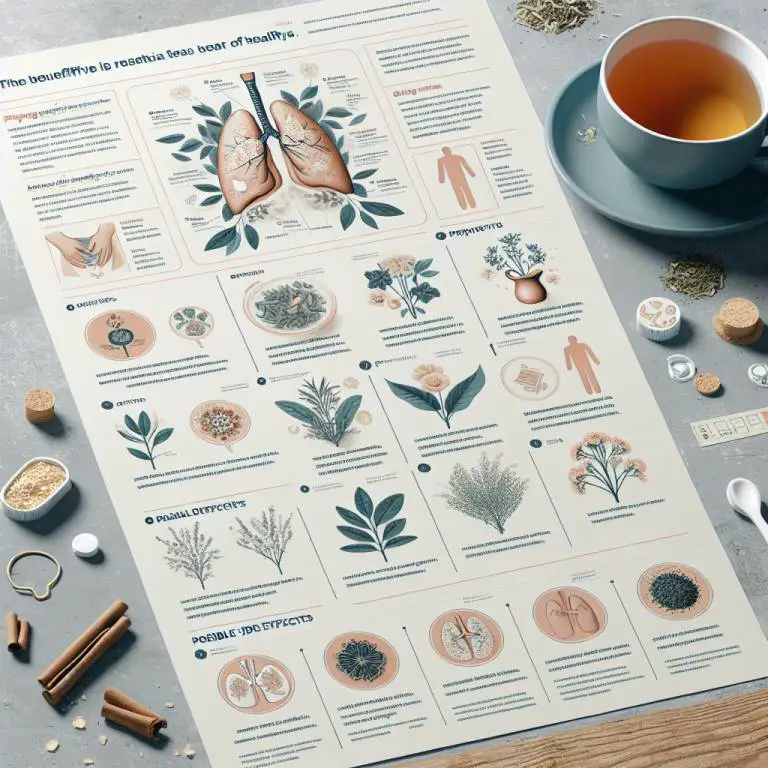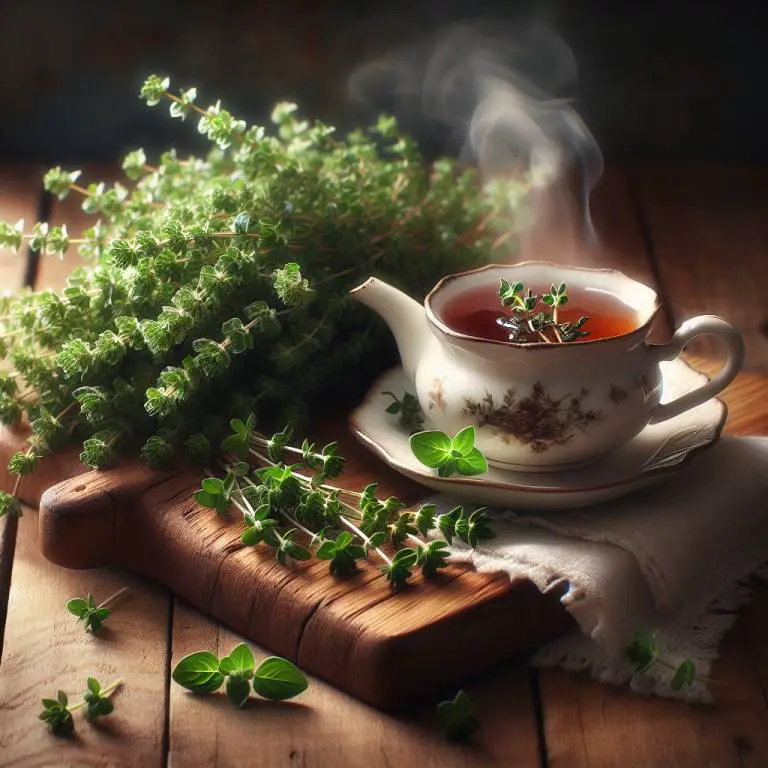Herbal teas for allergic asthma: Finding relief through nature
For those with allergic asthma seeking natural relief, certain herbal teas can help. Chamomile tea is known for its antihistamine properties, potentially easing allergy symptoms. Ginger tea also offers benefits by reducing inflammation and improving breathing. Drinking these teas may provide some comfort from the discomfort of allergic asthma.

What are the best herbal teas for allergic asthma relief?
For those suffering from allergic asthma, finding natural remedies can be a top priority. Herbal teas are a popular choice due to their soothing properties and potential health benefits. Among the best herbal teas for allergic asthma relief are chamomile, ginger, and green tea. These teas contain compounds that may help reduce inflammation and relax the airways, making breathing easier.
Chamomile tea is especially noted for its anti-inflammatory effects, which can be beneficial in reducing the symptoms of allergic asthma. Ginger tea is another excellent option as it contains gingerol, a compound known for its anti-inflammatory and antioxidant properties. Green tea, rich in catechins and epigallocatechin gallate (EGCG), has been shown to improve lung function and reduce asthma symptoms.
Which herbs have natural antihistamine properties that can help with asthma?
Natural antihistamines play a crucial role in managing allergic reactions, including those associated with asthma. Herbs such as butterbur, stinging nettle, and quercetin-rich foods like capers and onions possess natural antihistamine properties that can help alleviate asthma symptoms. These herbs work by blocking the action of histamine, a substance in the body that triggers allergy symptoms like sneezing, itching, and wheezing.
Butterbur has been studied for its effectiveness in reducing airway inflammation and bronchospasms associated with allergic reactions. Stinging nettle is another herb known for its ability to naturally block histamine receptors and ease allergy symptoms. Quercetin acts as an antioxidant and anti-inflammatory agent, further supporting respiratory health by stabilizing mast cells that release histamine.
Dive into the world of teas for asthma relief. Discover beneficial types and how to prepare them effectively.
How does green tea affect allergic asthma symptoms?
Green tea is renowned not only for its general health benefits but also for its positive impact on allergic asthma symptoms. The active components in green tea, particularly catechins and EGCG (epigallocatechin gallate), have been found to exhibit strong anti-inflammatory properties. These compounds help reduce inflammation in the airways, potentially easing breathing difficulties commonly experienced during asthma attacks.
In addition to its anti-inflammatory effects, green tea may enhance overall immune system performance. This could lead to a reduction in the frequency of allergic reactions triggering asthma symptoms. Regular consumption of green tea might therefore offer some relief to individuals dealing with allergic asthma by mitigating both inflammation and immune response related to allergens.
Can chamomile tea reduce allergy-induced asthma attacks?
Chamomile tea is often celebrated for its calming effects on the mind and body; however, it also holds promise for those struggling with allergy-induced asthma attacks. The main component of chamomile tea responsible for these potential benefits is bisabolol – an anti-inflammatory compound that may help soothe irritated airways caused by allergen exposure.
Furthermore, chamomile possesses antispasmodic properties which could aid in relaxing the muscles around the bronchi (air passages), leading to easier breathing during an asthmatic episode triggered by allergies. While more research is needed to fully understand chamomile’s efficacy in this area specifically, preliminary evidence suggests it could be a helpful adjunct therapy for managing allergy-induced asthma symptoms.
| Herbal Tea | Benefits for Allergic Asthma |
|---|---|
| Green Tea | Contains antioxidants and natural antihistamines that may reduce inflammation and allergic reactions. |
| Ginger Tea | Helps in reducing inflammation, soothing airways, and can alleviate symptoms of allergies. |
| Peppermint Tea | Natural decongestant; helps in relieving nasal congestion, headaches, and sinus issues associated with allergic asthma. |
| Licorice Root Tea | May soothe the lungs, ease respiratory issues, and has properties that could help in reducing allergic reactions. |
| Chamomile Tea | Known for its anti-inflammatory, antioxidant, and astringent properties. May help in managing symptoms of allergic asthma. |
| Turmeric Tea | The curcumin in turmeric has strong anti-inflammatory effects that can benefit those with allergies and asthma. |
| Nettle Leaf Tea | Traditionally used for its natural antihistamine effect. May help manage seasonal allergy symptoms including those affecting respiratory health. |
| Lemon Balm Tea | Potentially helpful in managing symptoms of asthma by acting as an antihistamine and reducing inflammation. |
What Role Does Peppermint Tea Play in Managing Asthma Symptoms?
Peppermint tea is known for its soothing properties, which can be beneficial for individuals with asthma. The menthol found in peppermint acts as a natural decongestant, helping to break down mucus and relieve congestion in the airways. This can make breathing easier for those suffering from asthma.
Additionally, peppermint tea has anti-inflammatory properties that can reduce inflammation in the respiratory system. This is crucial for asthma management as inflammation can lead to narrowed airways and increased difficulty in breathing. Drinking peppermint tea may help to soothe these symptoms and provide relief during an asthma attack.
How Can Ginger Tea Benefit Individuals with Allergic Asthma?
Ginger tea offers several health benefits, including potential relief for individuals with allergic asthma. Ginger contains compounds like gingerols and shogaols that have anti-inflammatory effects. These compounds can help reduce airway inflammation, a common issue for people with asthma, thereby improving airflow and making breathing easier.
Moreover, ginger has been shown to enhance bronchodilation, which is the widening of the bronchi and bronchioles in the lungs. This effect can help alleviate symptoms of tightness in the chest and shortness of breath associated with allergic asthma. Regular consumption of ginger tea might therefore support better respiratory function for those dealing with this condition.
Are There Any Risks Associated With Using Herbal Teas for Asthma Relief?
While herbal teas offer many benefits for managing asthma symptoms, there are potential risks involved. Some individuals may experience allergic reactions to certain herbs, which could worsen asthma symptoms instead of alleviating them. It’s important to be aware of personal allergies and consult a healthcare provider before trying new herbal remedies.
In addition, excessive consumption of some herbal teas may interact with prescription medications used for treating asthma. For instance, certain herbs might amplify the effects of stimulants or interfere with anti-inflammatory drugs. Therefore, moderation is key, and discussing any new herbal teas with a doctor is advisable to avoid adverse interactions.
Final Thoughts
Incorporating herbal teas such as peppermint and ginger into one’s diet can offer additional support in managing allergic asthma symptoms due to their natural anti-inflammatory and decongestant properties. They provide a complementary approach to traditional medication by potentially easing breathing difficulties and reducing inflammation.
However, it’s essential to proceed with caution when using herbal teas for asthma relief due to possible allergies or interactions with medications. Always consult a healthcare professional before adding new herbal remedies to your routine. With careful consideration, herbal teas can be a valuable part of managing allergic asthma effectively.







